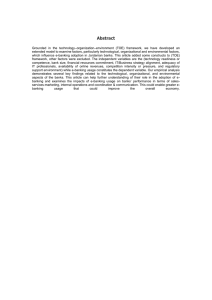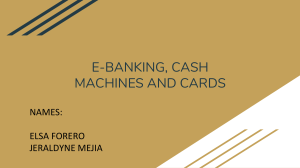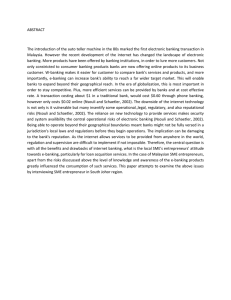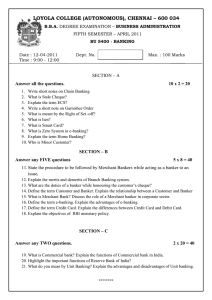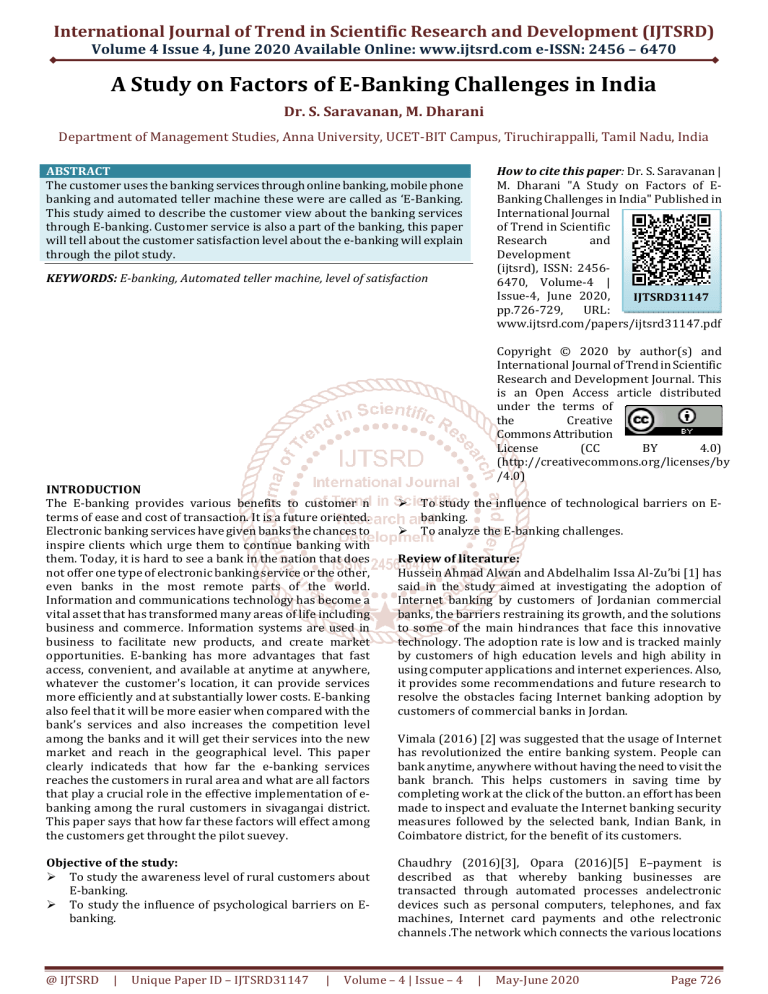
International Journal of Trend in Scientific Research and Development (IJTSRD) Volume 4 Issue 4, June 2020 Available Online: www.ijtsrd.com e-ISSN: 2456 – 6470 A Study on Factors of E-Banking Challenges in India Dr. S. Saravanan, M. Dharani Department of Management Studies, Anna University, UCET-BIT Campus, Tiruchirappalli, Tamil Nadu, India How to cite this paper: Dr. S. Saravanan | M. Dharani "A Study on Factors of EBanking Challenges in India" Published in International Journal of Trend in Scientific Research and Development (ijtsrd), ISSN: 24566470, Volume-4 | Issue-4, June 2020, IJTSRD31147 pp.726-729, URL: www.ijtsrd.com/papers/ijtsrd31147.pdf ABSTRACT The customer uses the banking services through online banking, mobile phone banking and automated teller machine these were are called as ‘E-Banking. This study aimed to describe the customer view about the banking services through E-banking. Customer service is also a part of the banking, this paper will tell about the customer satisfaction level about the e-banking will explain through the pilot study. KEYWORDS: E-banking, Automated teller machine, level of satisfaction Copyright © 2020 by author(s) and International Journal of Trend in Scientific Research and Development Journal. This is an Open Access article distributed under the terms of the Creative Commons Attribution License (CC BY 4.0) (http://creativecommons.org/licenses/by /4.0) INTRODUCTION The E-banking provides various benefits to customer n terms of ease and cost of transaction. It is a future oriented. Electronic banking services have given banks the chances to inspire clients which urge them to continue banking with them. Today, it is hard to see a bank in the nation that does not offer one type of electronic banking service or the other, even banks in the most remote parts of the world. Information and communications technology has become a vital asset that has transformed many areas of life including business and commerce. Information systems are used in business to facilitate new products, and create market opportunities. E-banking has more advantages that fast access, convenient, and available at anytime at anywhere, whatever the customer's location, it can provide services more efficiently and at substantially lower costs. E-banking also feel that it will be more easier when compared with the bank’s services and also increases the competition level among the banks and it will get their services into the new market and reach in the geographical level. This paper clearly indicateds that how far the e-banking services reaches the customers in rural area and what are all factors that play a crucial role in the effective implementation of ebanking among the rural customers in sivagangai district. This paper says that how far these factors will effect among the customers get throught the pilot suevey. Objective of the study: To study the awareness level of rural customers about E-banking. To study the influence of psychological barriers on Ebanking. @ IJTSRD | Unique Paper ID – IJTSRD31147 | To study the influence of technological barriers on Ebanking. To analyze the E-banking challenges. Review of literature: Hussein Ahmad Alwan and Abdelhalim Issa Al-Zu’bi [1] has said in the study aimed at investigating the adoption of Internet banking by customers of Jordanian commercial banks, the barriers restraining its growth, and the solutions to some of the main hindrances that face this innovative technology. The adoption rate is low and is tracked mainly by customers of high education levels and high ability in using computer applications and internet experiences. Also, it provides some recommendations and future research to resolve the obstacles facing Internet banking adoption by customers of commercial banks in Jordan. Vimala (2016) [2] was suggested that the usage of Internet has revolutionized the entire banking system. People can bank anytime, anywhere without having the need to visit the bank branch. This helps customers in saving time by completing work at the click of the button. an effort has been made to inspect and evaluate the Internet banking security measures followed by the selected bank, Indian Bank, in Coimbatore district, for the benefit of its customers. Chaudhry (2016)[3], Opara (2016)[5] E–payment is described as that whereby banking businesses are transacted through automated processes andelectronic devices such as personal computers, telephones, and fax machines, Internet card payments and othe relectronic channels .The network which connects the various locations Volume – 4 | Issue – 4 | May-June 2020 Page 726 International Journal of Trend in Scientific Research and Development (IJTSRD) @ www.ijtsrd.com eISSN: 2456-6470 and gives connectivity to the central office within theorganization is called intranet. Those intranet networks are limited to the organizations that use it. Singhal & Padhmanbhan, (2008)[4], Opara (2016)[5]Internet banking is now used as the term for new age banking system Internet banking is defined as the use ofInternet to deliver banking activities such as funds transfer, viewing current account’s data, paying bills and savings account balance, purchasing financial instruments and paying mortgages and certificates of deposits. 50.5% respondents belonging to the young age group and 43.3% respondents belonging to old age group are having medium awareness on e-banking. 31.2% of respondents belonging to young group and 14.2% respondents belonging to middle age group are having low awareness on e-banking. Security issues: Problem of Security in E-Banking are the Loss of data due to technical defaults and Lack of security measures. Every customers will have some fears about the security related things in it. Wen, Chen, & Hwang, (2001)[6]; Watson, Berthon, Pitt, & Zinkhan, (2008)[8]; Khurana, Goel, Singh, & Bhutani(2011)[7],Electronic commerce is an application of information technology that enables businesses to increase their profits and to improve market-shares, customer service, logistics, variety, quantity and quality by enhanced digital communications. Technical problems: The technical supports will be the one the major factors in the e-banking challenges i.e Less awareness regarding technology ,Insufficient technology, Lack of proper infrastructure for the installation of e-delivery channels, Flaws in design, implementation and monitoring bank’s information system . Factors which consider as a challenges: Awareness: The bank has tried to develope e-banking services in india to improve their operations and reduces cost.all the banks put lot of efforts to better and easier e-banking services,but these services remain largely unnoticed by the customers and eventhough some of not known about their availability due to their lack of knowledge. Network problems: For the e-banking services the internet connection is more important. if lack of network will also create a problem while using the e-banking services it will also a one of main problem in e-banking. Frequency table: Frequency of the variables will be calculated with the sample of 33 customers for the pilot study. There were a lot of variables which will comes under the above factors. Valid 0 Frequency 1 1 2 3 5 9 Total 9 17 2 3 1 33 types of services Percent Valid Percent 3.0 3.0 Cumulative Percent 3.0 27.3 27.3 51.5 51.5 6.1 6.1 9.1 9.1 3.0 3.0 100.0 100.0 Table1. types of services 30.3 81.8 87.9 97.0 100.0 Figure1. types of services @ IJTSRD | Unique Paper ID – IJTSRD31147 | Volume – 4 | Issue – 4 | May-June 2020 Page 727 International Journal of Trend in Scientific Research and Development (IJTSRD) @ www.ijtsrd.com eISSN: 2456-6470 awareness Valid Frequency Percent Valid Percent Cumulative Percent 0 1 3.0 3.0 3.0 1 8 24.2 24.2 27.3 2 10 30.3 30.3 57.6 3 8 24.2 24.2 81.8 4 6 18.2 18.2 100.0 Total 33 100.0 100.0 Table2. Awareness Figure2. Awareness security issues Valid Frequency Percent Valid Percent Cumulative Percent 0 1 3.0 3.0 3.0 1 3 9.1 9.1 12.1 2 15 45.5 45.5 57.6 3 9 27.3 27.3 84.8 4 5 15.2 15.2 100.0 Total 33 100.0 100.0 Table3. Security issues Figure3. Security issues @ IJTSRD | Unique Paper ID – IJTSRD31147 | Volume – 4 | Issue – 4 | May-June 2020 Page 728 International Journal of Trend in Scientific Research and Development (IJTSRD) @ www.ijtsrd.com eISSN: 2456-6470 Conclusion: Hense this paper is proposed to tell the opinion about the ebanking challenges by using the frequency of the variables . this will helps to know about the customer satisfaction level on e-banking in rural area. References: [1] Hussein Ahmad Alwan & Abdelhalim Issa Al-Zu’bi (2016),” Determinants of Internet Banking Adoption among Customers of Commercial Banks: An Empirical Study in the Jordanian Banking Sector”. International Journal of Business and Management; Vol. 11, No. 3; 2016 ISSN 1833-3850 E-ISSN 1833-8119 [2] V. Vimala (2016),” An Evaluative Study on Internet Banking Security among Selected Indian Bank Customers”, Amity Journal of Management Research 1(1), (63–79) ©2016 ADMAA. [3] Singhal, D., & Padhmanabhan, V. (2008). A Study on Customer Perception Towards Internet Banking: Identifying Major Contributing Factors. The Journal of Nepalese Business Studies, 1, 101-111. encryption forelectronic payment systems using elliptic curve cryptography”. Electronic Commerce Research, 16(1), 113-139. [5] Opara, B. C., Ozuru, H. N., & Akahome, J. E. (2016). “customer attitude and usage of internet banking services in rivers state, Nigeria”. Sustainable Human Development Review, 6(1-4). [6] Wen, H. J., Chen, H.-G., & Hwang, H.-G. (2001).” Ecommerce Web site design: strategies and models”. Information Management & Computer Security, 9(1), 512. [7] Khurana, H., Goel, M. K., Singh, H., & Bhutani, L. (2011). E-Commerce: Role of E-Commerce in Today’s Business. International Journal of Business & Management Research, 454-461. [8] Watson, R. T., Berthon, P., Pitt, L. F., & Zinkhan, G. M. (2008). “Electronic Commerce: The Strategic Perspective (Electronic edition ed.)”. (R. T. Watson, Ed.) Zurich, Switzerland: Creative Commons Attribution. Retrieved May, 2014, [4] Chaudhry, S. A., Farash, M. S., Naqvi, H., & Sher, M. (2016).” A secure and efficient authenticated @ IJTSRD | Unique Paper ID – IJTSRD31147 | Volume – 4 | Issue – 4 | May-June 2020 Page 729
